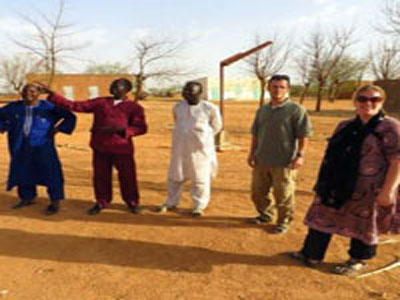December 3, 2016
Niger has consistently ranked at the bottom of the United Nations Human Development Index. Indicators that reflect that ranking include the following:
- Only 40 percent of men and 20 percent of women are literate.
- There is one doctor for every 50,000 people.
- One in seven women dies in childbirth.
- 40 percent of children under age five are malnourished.
- 20 percent of children die before their fifth birthday.
- Up to 90 percent of the population is involved in subsistence agriculture.
While the government of Niger is a secular democracy, about 97 percent of the population adheres to Islam and only 1 percent to Christianity. Although the Christian community is quite small, the larger society tends to look favorably upon it.
Many Muslim parents strive to send their children to Christian primary schools, because of the belief that they provide a strong education. Church-run clinics and hospitals are also heavily used.
The Presbyterian Church (U.S.A.) partner in Niger is the Evangelical Church in the Republic of Niger, known by the French acronym EERN. The EERN is a small church, with about 100 congregations and 16,000 adult members and children. But at this size, they are most likely the largest Christian body in the country.
The EERN runs three Bible schools—one each at the basic, intermediate, and advanced levels. The basic Bible school receives students preparing for ministry who may never have attended school. These students are given a basic education, which often includes being taught to read and write. The intermediate school prepares students to be evangelists for the church. The advanced school trains those who have served as evangelists to be pastors.
Although the role of evangelist and pastor is currently reserved for men, the wives of male students are also enrolled in the school and frequently receive the same education. In Nigerien society, because the dominant Muslim culture often restricts the ability of men and women to interact, there is also a need to educate women who are spouses of pastors and evangelists. These women have a great ability to impact the well-being of women and children in Niger, and the PC(USA) wants to encourage and support this.
Currently, Rev. Michael Ludwig, a PC(USA) mission co-worker, is working with the EERN in the Bible schools. The EERN also wants him to help revise the curriculum used to train students at the intermediate and advanced levels. This is a wonderful opportunity to build into the curriculum elements of a Community Health Evangelism (CHE) model of mission. Such a curriculum would educate church leaders in a way that allows them to have a great impact transforming society in areas of health and education, in addition to faith.
Another PC(USA) mission co-worker based in Niger is Claire Zuhosky. Claire has been appointed to work with youth and young adults of the EERN, as the church attempts to develop educational and skills training programs for them. Historically, Niger has struggled to equip the youth and young adults of the country with vocational, technical, and practical work skills. For this reason, the church feels called to step into the gap, to empower the youth of church and society to be a transformative force.
Juan Sarmiento, Evangelism Catalyst for Presbyterian World Mission
Today’s Focus: Niger
Let us join in prayer for:
PC(USA) Mission Co-Workers in Niger since 2014, serving at the invitation of the Evangelical Church in the Republic of Niger:
Claire Zuhosky
Michael Ludwig
Rachel Ludwig
PC(USA) Agencies’ Staff
Helen Locklear, BOP
Ann Logan, PMA
Let us pray
Gracious God, thank you for giving us gifts to share and strength to serve you faithfully. Amen.
Daily Lectionary
Morning Psalms 90; 149
First Reading Isaiah 4:2-6
Second Reading 1 Thessalonians 4:13-18
Gospel Reading Luke 21:5-19
Evening Psalms 80; 72
